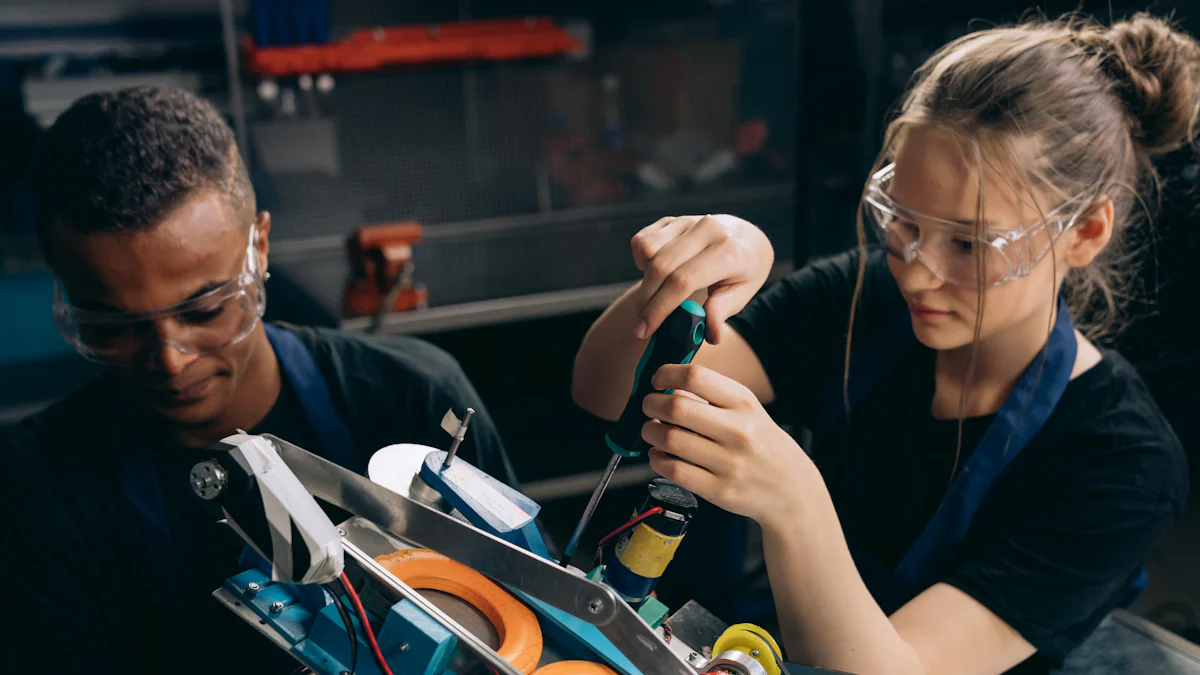Exploring Machine Learning in Modern Applicant Tracking Systems

Machine learning is revolutionizing the applicant tracking system, making it a pivotal tool in modern recruitment. You can now experience a more streamlined hiring process, where AI-driven systems enhance efficiency and fairness. According to the Society for Human Resource Management (SHRM), nearly 90% of large companies use these systems to optimize their recruitment efforts. This transformation not only improves the quality of candidates by 39% but also increases retention rates by 25%. As an HR professional, embracing these changes can significantly impact your recruitment strategies and outcomes.
Understanding Machine Learning in Applicant Tracking Systems
Definition of Machine Learning
Machine learning is a branch of artificial intelligence that enables systems to learn from data and improve their performance over time without explicit programming. You can think of it as a way for computers to identify patterns and make decisions based on data. This technology uses algorithms to analyze vast amounts of information, allowing systems to predict outcomes and automate processes. In the context of recruitment, machine learning helps streamline tasks by learning from past hiring data and improving decision-making.
Role of Machine Learning in Applicant Tracking Systems
In modern recruitment, machine learning plays a crucial role in enhancing the functionality of applicant tracking systems. These systems use machine learning to automate repetitive tasks, such as resume screening and candidate evaluation. By analyzing candidate data, machine learning algorithms can identify patterns and predict candidate success, leading to more informed hiring decisions. This not only reduces the time-to-hire by up to 50% but also increases the quality of hires by 70%, as noted in various studies.
Moreover, machine learning helps eliminate bias in the hiring process. By focusing on objective data rather than subjective judgments, it ensures a fairer evaluation of candidates. For example, companies like Unilever have successfully integrated machine learning algorithms into their recruitment processes, resulting in improved diversity within their candidate pool. This technology empowers you to focus on strategic aspects of hiring, making more data-informed decisions.
Machine learning also enhances candidate matching by continuously learning from past hiring decisions and outcomes. This leads to better predictive analytics, allowing you to discover and onboard talent more effectively. As a result, applicant tracking systems become more efficient, providing valuable data for better decision-making and ultimately transforming how organizations approach recruitment.
Features Enhanced by Machine Learning in Applicant Tracking Systems

Resume Screening
In the realm of recruitment, resume screening often proves to be a time-consuming task. With the integration of machine learning, you can automate this process, allowing the applicant tracking system to efficiently sift through countless resumes. AI-powered ATS solutions utilize algorithms to analyze and match candidates' qualifications and experience with job requirements. This automation not only saves you time but also enhances the accuracy of identifying suitable candidates. By focusing on predefined criteria, the system ensures that only the most relevant resumes reach your desk, streamlining the initial stages of recruitment.
Candidate Matching
Finding the right candidate for a position involves more than just matching skills to job descriptions. Machine learning enhances candidate matching by continuously learning from past hiring decisions and outcomes. AI-driven ATS systems can assess candidates' skills, experience, and cultural fit, providing insights into their potential performance. This capability allows you to make more informed decisions, ensuring that the candidates you consider are not only qualified but also likely to thrive in your organization. By leveraging historical data and sophisticated algorithms, these systems predict a candidate's future success, making the recruitment process more effective.
Communication and Engagement
Effective communication with candidates is crucial in maintaining a positive recruitment experience. Machine learning in applicant tracking systems automates communication, ensuring timely and consistent engagement with candidates. AI-driven ATS can schedule interviews, send follow-up emails, and even provide updates on application status. This automation allows you to focus on building relationships with top talent rather than getting bogged down by administrative tasks. By maintaining open lines of communication, you enhance the candidate experience, which can lead to higher acceptance rates and a stronger employer brand.
Benefits of Machine Learning in Applicant Tracking Systems
Increased Efficiency
Machine learning significantly boosts the efficiency of your recruitment process. By automating repetitive tasks like resume screening and candidate ranking, you save valuable time. This automation allows you to focus on strategic decision-making rather than getting bogged down by administrative duties. Survey Results: Organizations using AI in recruitment report a 39% increase in the quality of candidates. This improvement stems from the system's ability to parse resumes, rank candidates, and score them based on their fit for the role. As a result, you can fill positions faster and more effectively.
Improved Candidate Experience
A positive candidate experience is crucial for attracting top talent. Machine learning in applicant tracking systems enhances this experience by keeping applicants informed throughout the recruitment process. Automated communication ensures that candidates receive timely updates on their application status. This transparency shows that you value their time and effort, leading to a more favorable impression of your organization. Survey Results: AI-driven systems improve the candidate experience by maintaining consistent engagement, which can lead to higher acceptance rates and a stronger employer brand.
Enhancement of Diversity and Inclusion
Diversity and inclusion are essential components of a successful workplace. Machine learning helps you achieve these goals by minimizing unconscious bias in the hiring process. By assessing candidates solely on their qualifications and experience, AI ensures a fairer evaluation. This objectivity leads to a more diverse candidate pool, as it eliminates biases that might otherwise influence hiring decisions. Survey Results: AI minimizes hiring bias, allowing you to focus on finding the best candidates for your organization. This approach not only enhances diversity but also contributes to a more inclusive work environment.
Potential Challenges and Drawbacks of Machine Learning in Applicant Tracking Systems
Data Quality Issues
Data quality plays a crucial role in the effectiveness of machine learning within applicant tracking systems. You rely on accurate and comprehensive data to make informed hiring decisions. Poor data quality can lead to incorrect predictions and flawed candidate evaluations. Incomplete or outdated information may skew the results, causing you to overlook qualified candidates. Ensuring data accuracy requires regular updates and validation processes. By maintaining high-quality data, you enhance the reliability of your machine learning algorithms.
Risk of Bias in Algorithms
Machine learning algorithms can inadvertently perpetuate biases present in historical data. You must remain vigilant to prevent these biases from affecting recruitment outcomes. Harvard Business Review emphasizes the importance of continuously monitoring and training AI algorithms to recognize and rectify biases. This proactive approach ensures that diversity, equity, and inclusion remain at the forefront of technological advancements in recruitment. Designing systems that provide a fair chance for all candidates, regardless of their background, becomes essential. By committing to ethical and inclusive practices, you mitigate the risk of bias in your recruitment processes.
Privacy Concerns
Privacy concerns arise when handling sensitive candidate information within applicant tracking systems. You must prioritize data protection to maintain trust with applicants. Machine learning systems often require access to personal data, raising questions about how this information is stored and used. Implementing robust security measures and transparent data policies helps address these concerns. By safeguarding candidate data, you demonstrate a commitment to privacy and build a positive reputation for your organization.
Future Trends in Machine Learning for Applicant Tracking Systems

Predictive Analytics
Predictive analytics represents a significant advancement in the realm of applicant tracking systems. By leveraging historical data, you can forecast future hiring outcomes with greater accuracy. This capability allows you to anticipate candidate success and make informed decisions. AI-driven systems analyze patterns in candidate data, enabling you to predict which applicants are most likely to excel in specific roles. This foresight not only enhances the quality of hires but also optimizes your recruitment strategy over time. As a result, predictive analytics transforms how you approach talent acquisition, making it more strategic and data-driven.
Integration with Other HR Technologies
The integration of machine learning with other HR technologies marks a pivotal shift in recruitment processes. By connecting applicant tracking systems with tools like human resource management systems (HRMS) and performance management software, you create a seamless flow of information. This integration enables you to gain a holistic view of candidates, from application to onboarding and beyond. It also facilitates better collaboration among HR teams, ensuring that all aspects of talent management are aligned. As you embrace this interconnected approach, you enhance the efficiency and effectiveness of your recruitment efforts.
Continuous Learning and Adaptation
Continuous learning and adaptation are essential components of modern applicant tracking systems. Machine learning algorithms evolve by analyzing new data and refining their predictions. This adaptability ensures that your recruitment processes remain relevant and effective in a rapidly changing job market. As the system learns from each hiring decision, it becomes more adept at identifying top talent. This continuous improvement leads to more accurate candidate matching and better hiring outcomes. By embracing this dynamic approach, you position your organization to stay ahead in the competitive landscape of talent acquisition.
Machine learning in applicant tracking systems offers numerous benefits. You gain increased efficiency, improved candidate quality, and enhanced diversity. By automating tasks like resume screening, AI allows you to focus on strategic hiring decisions. However, challenges such as data quality and algorithm bias require attention. Looking ahead, AI's role in recruitment will continue to evolve. Predictive analytics and integration with other HR technologies will shape future trends. Embrace these changes to transform your recruitment strategies. Machine learning is not just a tool; it's a game-changer in modern recruitment.
See Also
Leveraging Applicant Tracking Systems for Effective Onboarding
Utilizing Applicant Tracking Systems to Spot Top Candidates
Improving Recruitment Clarity with Applicant Tracking Systems
Deciphering Business Requirements Using Applicant Tracking Systems
From recruiting candidates to onboarding new team members, MokaHR gives your company everything you need to be great at hiring.
Subscribe for more information

